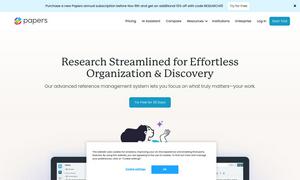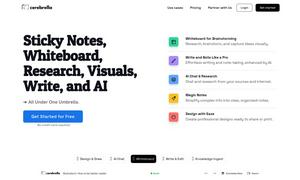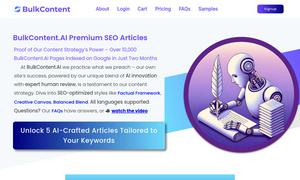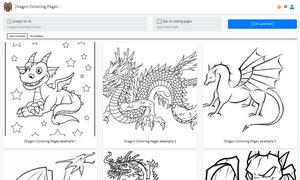Discover the Best AI Tools to Boost Your Productivity
Find the Best AI Tools to Optimize Your Work and Personal Tasks
Best AI Tools for Reference management Task in 2024
What is Reference management
Reference management is essential for organizing and citing sources in research and academic writing. It streamlines the process, ensuring accuracy and saving time. By automatically formatting citations and creating bibliographies, it enhances productivity, making it invaluable for students, researchers, and professionals handling extensive literature.
How Reference management works
Reference management works by providing users with software solutions that allow them to collect, organize, and cite their research materials. Users can import references from various databases, create folders for specific projects, and generate in-text citations and bibliographies automatically. This streamlines the research process and ensures adherence to citation styles.
What are the advantages of Reference management?
The advantages of reference management include increased efficiency and improved organization, allowing users to focus on research rather than citation formatting. Its ability to automatically create citations eliminates errors and saves time, making it a practical tool for students and researchers who manage numerous sources in their work.
Key Features for Reference management
Automatic Citation Generation
Automatic citation generation is a key feature of reference management that simplifies the citation process for users. By instantly creating accurate citations in multiple styles, it saves time and reduces errors, allowing students and researchers to focus on content rather than formatting their references.
Collaborative Features
Collaborative features in reference management tools enable multiple users to work together on research projects seamlessly. These functionalities include shared libraries and group annotations, enhancing teamwork and ensuring all contributors have access to a centralized database of resources and citations.
Compatibility with Various Citation Styles
Compatibility with various citation styles is a defining feature of reference management tools. Users can easily switch between different formatting styles, such as APA, MLA, or Chicago, ensuring that their references meet specific requirements for any academic or professional work, providing adaptability to diverse environments.
Use Cases for Reference management?
Reference management is invaluable in scenarios such as writing academic papers, dissertations, and articles where accurate citations are essential. It helps researchers collaborate on projects, ensuring all sources are properly credited. Moreover, it addresses complex citation styles that may vary by discipline, simplifying the citation process.
FAQs for Reference management
What are the key benefits of using reference management tools for researchers?
Using reference management tools offers researchers several benefits, including streamlined organization of sources, efficient citation generation, and enhanced accuracy in referencing. These tools save time, reduce the risk of errors, and allow researchers to focus more on their analysis and content creation, significantly improving their workflow.
How does reference management enhance collaboration among researchers?
Reference management enhances collaboration by providing shared libraries and annotation capabilities, which allow multiple users to access and contribute to the same pool of references. This feature streamlines teamwork, facilitates discussions around sources, and ensures that all collaborators stay aligned in their research efforts.
In what ways does reference management simplify the citation process?
Reference management simplifies the citation process by automating the generation of citations and bibliographies in various formats. Users can import references directly from academic databases, eliminating the tedious manual entry, thus ensuring accuracy while allowing them to focus on their research and writing.
What unique features distinguish reference management from other research tools?
Unique features distinguishing reference management from other research tools include automatic citation generation, support for multiple citation styles, and collaborative functionalities. These aspects enhance efficiency and ensure users can manage their references seamlessly while adhering to academic standards and improving group workflows.
How does reference management meet the needs of academic writers?
Reference management meets the needs of academic writers by offering tools for organizing sources, generating citations, and formatting bibliographies. This functionality addresses the complexities involved in academic writing, saving time and ensuring that papers are accurately referenced according to discipline-specific standards.
What makes the user experience with reference management tools effective?
The user experience with reference management tools is effective due to their intuitive interfaces, comprehensive support for various citation styles, and advanced organizational features. These elements facilitate easy navigation and improve the overall efficiency of managing references, making it simpler for users to maintain their research accessibility.
You may also like:
Team leadership advice
Team leadership advice helps leaders enhance team performance and collaboration.
Generate surgery cards
Generate surgery cards simplify surgical preparation, boosting efficiency and safety.
Improve decision-making
Improve decision-making enhances judgment and efficiency, leading to better outcomes.
Ad Compliance Checker
Ad Compliance Checker ensures ads meet regulations, enhancing campaign effectiveness.
Transcribing content
Transcribing content makes spoken language accessible in written form, enhancing reach and understanding.
Generate Marketing Content
"Generate Marketing Content" efficiently creates engaging material for brand promotion.
Generate map queries
Generate map queries empower users to create tailored maps, enhancing data visualization.
Typing practice
Typing practice enhances speed and accuracy for efficient communication.








